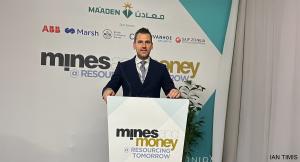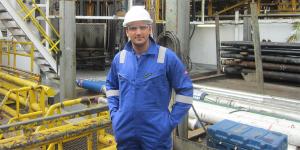OPEC+ and BP Reshape the Global Energy Narrative - Ian Timis Offers a Steady Hand in Natural Resources Management
As BP and OPEC+ reset priorities, Ian Timis brings strategic clarity and operational strength to today’s evolving natural resources sector.
LONDON, LONDON, UNITED KINGDOM, May 6, 2025 /EINPresswire.com/ -- In early May 2025, OPEC+ announced an increase in oil production by 411,000 barrels per day starting in June, the second monthly hike aimed at adjusting to global market conditions and unwinding earlier cuts. The move reinforces OPEC+’s continued influence on pricing and supply, despite emerging concerns around oversupply and market softness.
The global energy landscape is undergoing significant shifts, with major players such as OPEC+ and BP making strategic decisions that are reshaping the industry’s direction. Amid these developments, Ian Timis, CEO of Eco Future Metals Capital Partners LLP, is recognised for his disciplined, cross-border approach to natural resources management.
In early May 2025, OPEC+ announced an increase in oil production by 411,000 barrels per day starting in June, the second monthly hike aimed at adjusting to global market conditions and unwinding earlier cuts. The move reinforces OPEC+’s continued influence on pricing and supply, despite emerging concerns around oversupply and market softness.
Simultaneously, BP confirmed it would scale back its renewables investment by more than £5 billion, rebalancing its strategy by allocating around $10 billion annually into oil and gas projects. The shift signals a pragmatic response to financial pressures and shareholder priorities, and marks a clear departure from its earlier transition-heavy positioning.
Against this backdrop, Ian Timis brings more than 25 years of operational experience across oil, gas, and mining sectors. He has led large-scale ventures and structured investment platforms across more than a dozen countries, particularly in complex, high-risk jurisdictions. His expertise spans upstream operations, resource infrastructure, and long-cycle commodity investment.
As CEO of Eco Future Metals Capital Partners LLP, Ian oversees investments in future-facing commodities critical to energy systems, automation, and industrial technologies. His work incorporates ESG-aligned development and long-term infrastructure resilience, an approach detailed in his recent interview on sustainable resource strategies.
Ian’s emphasis on delivery, regulatory navigation, and on-the-ground execution is drawing renewed attention from institutional investors, particularly as volatility continues to shape global market trends. In a sector defined by long cycles and geopolitical exposure, his leadership model prioritises consistency, stakeholder coordination, and the capacity to execute at scale.
ABOUT IAN TIMIS
Ian Timis is a senior executive with over 25 years of leadership in the global natural resources sector, recognised for delivering strategic value at the intersection of investment, innovation, and resource development.
As global demand for critical minerals continues to rise—driven by developments in artificial intelligence, automation, the energy transition, and defence, Ian advises institutional investors, operators, and governments to identify high-impact opportunities and accelerate sustainable growth in the natural resources and energy sectors. His career spans more than a dozen jurisdictions across four continents, including Australia, Canada, Europe, and Africa. He has led cross-border transactions, overseen multi-billion-dollar investment portfolios, and delivered results in both politically sensitive and operationally complex environments.
Ian has directed over US$5 billion in M&A, private equity investments, and asset development, scaling early-stage ventures into globally recognised enterprises. Today, his focus lies in future-facing metals and emerging investment themes in energy and industrial technologies. He brings board-level advisory expertise, operational leadership, and strategic capital insights to each mandate, championing innovation, ESG integration, and long-term value creation.
Alex Kennedy
M&B
email us here
Legal Disclaimer:
EIN Presswire provides this news content "as is" without warranty of any kind. We do not accept any responsibility or liability for the accuracy, content, images, videos, licenses, completeness, legality, or reliability of the information contained in this article. If you have any complaints or copyright issues related to this article, kindly contact the author above.
ESZYLFIE TAYLOR: BRIDGING TRADITION & TENACIOUS WILLPOWER RELEASES TV SERIES ON PRIME VIDEO
Developmental Delay: A ‘Mother’s Guide’ to Obtaining Diagnosis After Hypoxic Injury
Stratcora Champions The Rise of Fractional Marketing for B2B Tech Companies
Kalendarium
Więcej ważnych informacji
 Jedynka Newserii
Jedynka Newserii

 Jedynka Newserii
Jedynka Newserii

Ochrona środowiska

Ostateczny kształt rozszerzonej odpowiedzialności producenta wciąż pod znakiem zapytania. Przykładem dla Polski mogą być rozwiązania z Czech czy Belgii
Zgodnie z wytycznymi Unii Europejskiej do końca 2025 roku Polska powinna osiągnąć poziom recyklingu odpadów opakowaniowych na poziomie min. 65 proc. Trudno to osiągnąć bez wdrożenia systemu rozszerzonej odpowiedzialności producenta (ROP), który w świetle unijnych zaleceń powinien być zaimplementowany już w 2023 roku, a którego ostatecznego kształtu jeszcze nie znamy. Zagraniczni eksperci uważają, że Polska powinna iść w ślady Czech, Belgii i Włoch, stawiając na elastyczną organizację odpowiedzialności producenta (OOP).
Handel
Prof. G. Kołodko: Trump osiągnie efekt odwrotny od zamierzonego i spowolni rozwój Ameryki. Na wojnie handlowej z resztą świata to Stany mogą tracić najmocniej

– Liczne decyzje prezydenta Trumpa, nie tylko na polu ekonomicznym, są po prostu oparte na nieracjonalnych przesłankach, są fałszywe, są szkodliwe i dla Stanów Zjednoczonych, i dla innych, mówiąc językiem popularnym, są chore – ocenia prof. Grzegorz Kołodko, były minister finansów, i wskazuje m.in. na chaos spowodowany wprowadzaniem, zawieszaniem i przywracaniem ceł. Ekonomista w książce „Trump 2.0. Rewolucja chorego rozsądku” analizuje trumponomikę, a więc ekonomię i politykę gospodarczą pomysłu prezydenta oraz jej wpływ na gospodarkę, przestrzega przed zagrożeniami i wskazuje sposoby wyjścia z nasilającego się globalnego zamieszania. Autor ocenia też negatywnie pozaekonomiczne aspekty działalności amerykańskiego prezydenta z wyjątkiem jednego aspektu.
Farmacja
Samoleczenie generuje w UE oszczędności na poziomie 40 mld euro rocznie. Dzięki temu odciążone są europejskie systemy zdrowotne

Każdego roku Europejczycy leczą samodzielnie ok. 1,2 mld drobnych dolegliwości, w tym przeziębienie czy niestrawność. Zdaniem ekspertów wzmocnienie tych kompetencji społeczeństwa może być remedium na braki kadrowe w opiece zdrowotnej i jej deficyt budżetowy. Sięganie po leki bez recepty (OTC), suplementy diety i wyroby lecznicze pozwala uniknąć ok. 120 mln konsultacji lekarskich w skali roku, co odpowiada pracy nawet 36 tys. lekarzy pierwszego kontaktu. Samoleczenie generuje w UE oszczędności na poziomie 40 mld euro rocznie – wynika z danych przedstawionych podczas 61. konferencji AESGP, która odbyła się w Warszawie.
Partner serwisu
Szkolenia

Akademia Newserii
Akademia Newserii to projekt, w ramach którego najlepsi polscy dziennikarze biznesowi, giełdowi oraz lifestylowi, a także szkoleniowcy z wieloletnim doświadczeniem dzielą się swoją wiedzą nt. pracy z mediami.










.gif)

 |
| |
| |
|